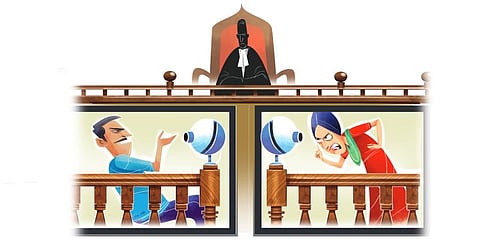Irretrievable breakdown of marriage ground for divorce: SC
NEW DELHI: The Supreme Court on Monday introduced irretrievable breakdown of marriage as a ground for divorce, ruling it has the right to invoke its special powers under Article 142 of the Constitution if it is convinced that a marriage is totally unworkable, emotionally dead and beyond salvation.
Emphasising that seeking divorce on this ground is not a matter of right, a five-judge bench of justices S K Kaul, Sanjiv Khanna, A S Oka, Vikram Nath and J K Maheshwari said the period of separation should be sufficiently long — anything above six years — before it can be considered.
The 62-page verdict authored by Justice Khanna said it would also have to consider other factors such as the time of last cohabitation, nature of allegations made by parties against each other and family members, orders passed in the legal proceedings from time to time, cumulative impact on the personal relationship and attempts made for settling disputes by court’s intervention.
The economic and social status of the parties also need to be factored in. “These facts have to be evaluated keeping in view the economic and social status of the parties, including their educational qualifications, whether the parties have any children, their age, educational qualification, and whether the other spouse and children are dependent, in which event how and in what manner the party seeking divorce intends to take care and provide for the spouse or the children. Question of custody and welfare of minor children, provision for fair and adequate alimony for the wife, and economic rights of the children and other pending matters, if any, are relevant considerations.”
Dispensing with the mandatory waiting period of 6-18 months for divorce through mutual consent, the court while underscoring the legislative intent behind the time gap said waiver can be granted if the SC is satisfied that the marriage is beyond repair and if certain conditions are met (see box).
Adopting a hyper-technical view can be counter-productive as pendency itself causes pain, suffering and harassment, the bench observed, adding matters must be amicably resolved to bring the agony, affliction, and torment to an end. The bench, however, barred parties from filing writ petitions under Article 32 seeking a divorce from the SC directly.
Waiver procedure
Factors to be kept in mind before waiving the statutory period under Section 13-B(2) of the Hindu Marriage Act
- The statutory period of 6 months specified in 13-B(2) and one year in 13-B(1) of separation of parties is already over before the first motion.
- All efforts for mediation/conciliation etc., to reunite the parties failed and there is no likelihood of success in that direction any longer.
- The parties have genuinely settled differences including alimony, custody of child or any other pending issues.
- The waiting period will only prolong their agony.
- Waiver application can be filed one week after the first motion. The waiver will be at the court’s discretion.

